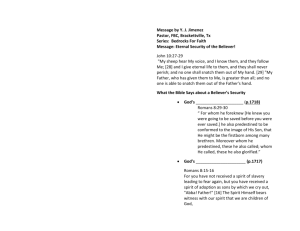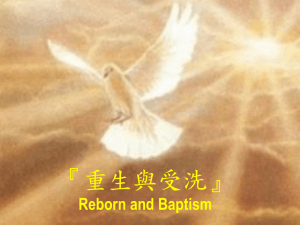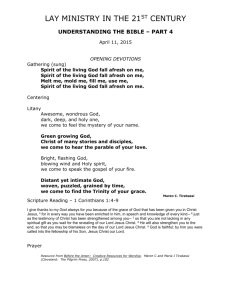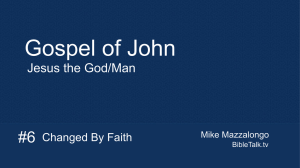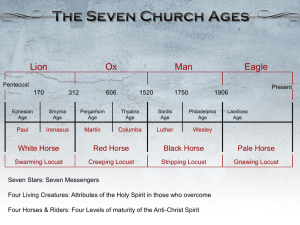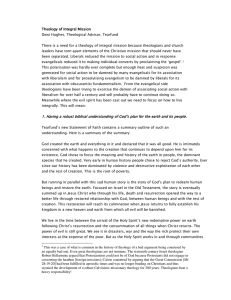Blowin` With the Wind John 3:1-18 June 3, 2012 His name is Rollen
advertisement
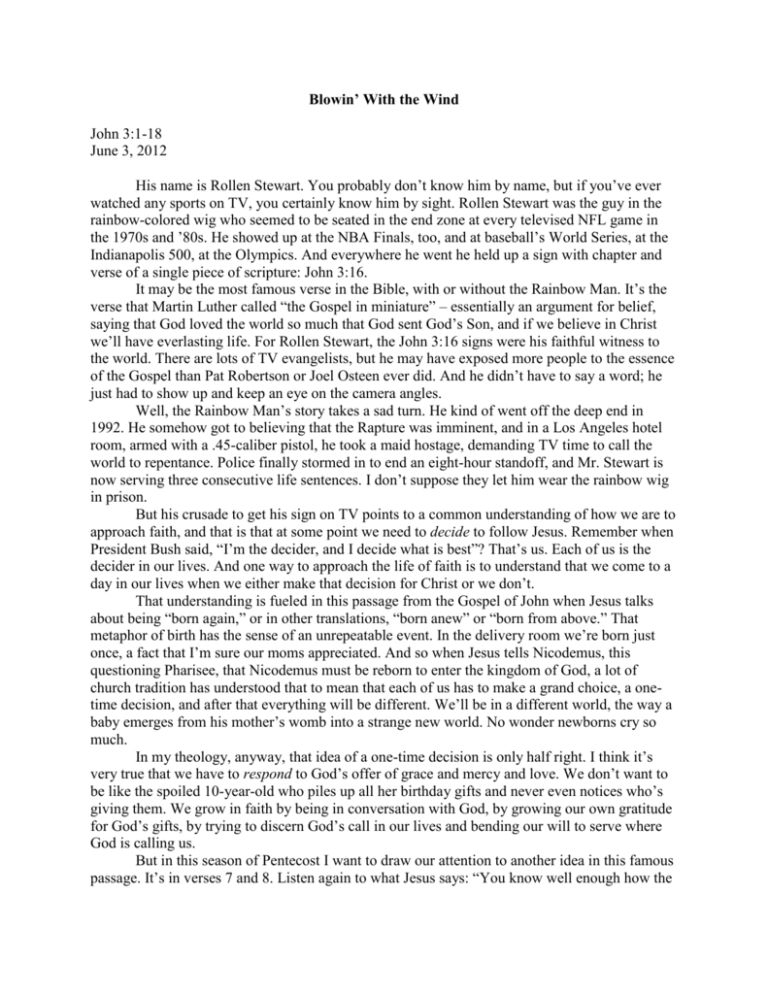
Blowin’ With the Wind John 3:1-18 June 3, 2012 His name is Rollen Stewart. You probably don’t know him by name, but if you’ve ever watched any sports on TV, you certainly know him by sight. Rollen Stewart was the guy in the rainbow-colored wig who seemed to be seated in the end zone at every televised NFL game in the 1970s and ’80s. He showed up at the NBA Finals, too, and at baseball’s World Series, at the Indianapolis 500, at the Olympics. And everywhere he went he held up a sign with chapter and verse of a single piece of scripture: John 3:16. It may be the most famous verse in the Bible, with or without the Rainbow Man. It’s the verse that Martin Luther called “the Gospel in miniature” – essentially an argument for belief, saying that God loved the world so much that God sent God’s Son, and if we believe in Christ we’ll have everlasting life. For Rollen Stewart, the John 3:16 signs were his faithful witness to the world. There are lots of TV evangelists, but he may have exposed more people to the essence of the Gospel than Pat Robertson or Joel Osteen ever did. And he didn’t have to say a word; he just had to show up and keep an eye on the camera angles. Well, the Rainbow Man’s story takes a sad turn. He kind of went off the deep end in 1992. He somehow got to believing that the Rapture was imminent, and in a Los Angeles hotel room, armed with a .45-caliber pistol, he took a maid hostage, demanding TV time to call the world to repentance. Police finally stormed in to end an eight-hour standoff, and Mr. Stewart is now serving three consecutive life sentences. I don’t suppose they let him wear the rainbow wig in prison. But his crusade to get his sign on TV points to a common understanding of how we are to approach faith, and that is that at some point we need to decide to follow Jesus. Remember when President Bush said, “I’m the decider, and I decide what is best”? That’s us. Each of us is the decider in our lives. And one way to approach the life of faith is to understand that we come to a day in our lives when we either make that decision for Christ or we don’t. That understanding is fueled in this passage from the Gospel of John when Jesus talks about being “born again,” or in other translations, “born anew” or “born from above.” That metaphor of birth has the sense of an unrepeatable event. In the delivery room we’re born just once, a fact that I’m sure our moms appreciated. And so when Jesus tells Nicodemus, this questioning Pharisee, that Nicodemus must be reborn to enter the kingdom of God, a lot of church tradition has understood that to mean that each of us has to make a grand choice, a onetime decision, and after that everything will be different. We’ll be in a different world, the way a baby emerges from his mother’s womb into a strange new world. No wonder newborns cry so much. In my theology, anyway, that idea of a one-time decision is only half right. I think it’s very true that we have to respond to God’s offer of grace and mercy and love. We don’t want to be like the spoiled 10-year-old who piles up all her birthday gifts and never even notices who’s giving them. We grow in faith by being in conversation with God, by growing our own gratitude for God’s gifts, by trying to discern God’s call in our lives and bending our will to serve where God is calling us. But in this season of Pentecost I want to draw our attention to another idea in this famous passage. It’s in verses 7 and 8. Listen again to what Jesus says: “You know well enough how the wind blows this way and that. You hear it rustling through the trees, but you have no idea where it comes from or where it’s headed next. That’s the way it is with everyone ‘born from above’ by the wind of God, the Spirit of God.” Now, with all due respect, Jesus is engaging here in the lowest form of humor, the pun. Because the same Greek word, pneuma, can be used for both “wind” and “Spirit.” Jesus is struggling to convey a sense of the Holy Spirit, a Spirit that moves where it will, heedless of human volition. And to do that he says to Nicodemus, consider the wind. It goes its own way, but you can’t perceive it directly, only through the rustling leaves on the trees. Where the wind comes from and where it’s going – those things are a mystery. God’s Holy Spirit, he says, is like that. It touches us in ways that are beyond human understanding and beyond human control. In some sense our invitation into the kingdom of God is not up to us. God’s loving Spirit will find us in its own good time. It breathes into our world from another world. And for this Pharisee, who is used to the logical arguments of the Jewish scriptural commentary called midrash, that’s a mind-blowing idea. “How does this happen?” he asks Jesus – a logical left-brain question in service of a transcendental right-brain idea. And essentially Jesus says, you have to trust that it happens. We don’t know with any certitude where the Spirit comes from; we don’t know where it’s leading us. But in trust and belief, we can breathe in God’s gifts of love and mercy and grace. It was a busy week for me, so I wrote this sermon at home yesterday, looking out our front window at the one big tree we have. It was a windy day, and that tree was alive with movement. It seemed to be having a conversation with the wind, dancing a pas de deux in which the wind moved on and the tree, for all its liveliness, stayed put. I was reminded that sometimes on calm days I don’t really see that tree; it’s only the animation of the wind that reminds me of its beauty and its flexibility. The movement makes visible the gifts of the tree. And that’s what makes the difference in our understanding of this scripture from John. Because we do have calm days, but the wind comes again and again. And as much as we are called to respond to God’s voice in our lives, we do so not as a one-time event, but as a continual dance with the Holy Spirit, the animating force of love in our lives. When God sent the Spirit to the disciples on the day of Pentecost, it came as tongues of fire but also as “the rush of a violent wind.” And so it comes to us as well – to us as, day by day, we try to discern God’s presence in our lives; to us as the church as we feel the tug of serving Christ in this time and place. “The wind blows this way and that,” Jesus says. “You have no idea where it comes from or where it’s headed next.” May the Holy Spirit blow us around a little bit, animate us to do Christ’s work and to be Christ’s people. And day by day, may we respond to this mysterious movement of love with open minds and with hearts full of joy. May it be so. Amen.

